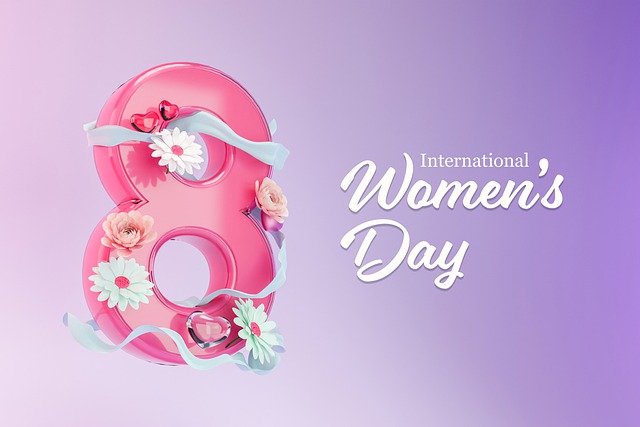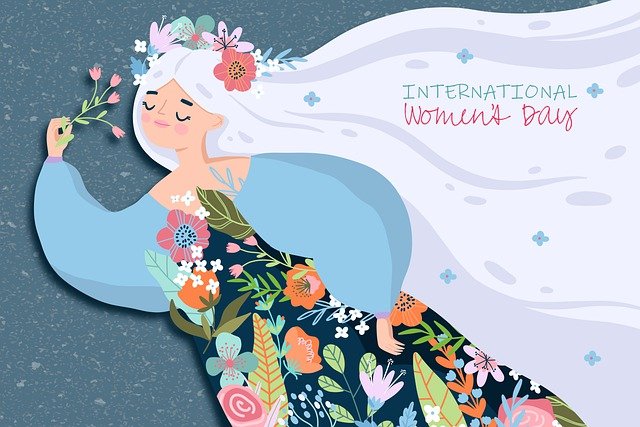Celebrating International Women’s Day Posted by sasha on Mar 8, 2022 in Culture, Holidays
Today is International Women’s Day (今天是国际妇女节 jīntiān shì guójì fùnǚ jié). In this post, we’ll take a closer look at the holiday and learn some Chinese vocabulary related to it. Let’s start out by learning a brief history of this important day.
History of International Women’s Day
This global holiday dates back to 1909 in New York City in honor of a garment and textile workers’ strike that happened a year prior. It was organized by the Socialist Party of America (美国社会党组织 měiguó shèhuìdǎng zǔzhī) to protest poor working conditions and low wages (恶劣的工作条件和低廉的工资 Èliè de gōngzuò tiáojiàn hé dīlián de gōngzī).
The movement made it to Europe the next year, with a Socialist International meeting in Copenhagen (哥本哈根 gēběnhāgēn). They proposed an annual celebration to honor the contributions of women and in support of universal suffrage (普选制 pǔxuǎn zhì).
A few years later in 1917, women in Russia (俄罗斯 Èluósī) protested for “Bread and Peace” (面包与和平 miànbāo yǔ hépíng) – an end to World War I and the food shortages it caused. This was the start of the February Revolution (二月革命 Èr yuè gémìng)
This took place on February 23 on the Julian calendar, which corresponded to March 8 on the Gregorian calendar that was later adopted by Russia. That’s why International Women’s Day now falls on March 8 around the world.
Just a few days later, Czar Nicholas II abdicated, ending the 300-year reign of the House of Romanov. The provisional government that followed soon granted women the right to vote.
Fast forward a few decades when 1975 was declared International Women’s Year. That’s when the United Nations (联合国 liánhéguó) began celebrating the holiday. Two years later, they adopted a resolution to encourage member states to designate a United Nations Day for Women’s Rights and International Peace, to be observed on a date of their choice.
Customs of Int’l Women’s Day
Societies everywhere celebrate the important contributions of women in the political, economic, and social fields (各地社会庆祝妇女在政治, 经济, 和社会等领域做出的重要贡献 gèdì shèhuì qìngzhù fùnǚ zài zhèngzhì, jīngjì, hé shèhuì děng lǐngyù zuò chū de zhòngyào gòngxiàn). The holiday is also meant to further advance the women’s rights movement, advocating for issues such as gender equality and reproductive rights.
Every year, there United Nations designates a different theme for the holiday. This year’s theme for UN Women’s Day is “Gender Equality for a Sustainable Future” (今年联合国妇女节的主题是”性别平等共创可持续未来” jīnnián liánhéguó fùnǚ jié de zhǔtí shì “xìngbié píngděng gòng chuàng kě chíxù wèilái”). It’s focused on the dangers of climate change and the important role women are playing in the response. Click here to learn more about it.
In a sign of the times, there’s also an annual hashtag associated with the holiday. This year it’s #BreakTheBias (打破偏见 dǎpò piānjiàn), calling on people to “Imagine a gender-equal world” (想象一个性别平等的世界 xiǎngxiàng yīgè xìngbié píngděng de shìjiè).
As far as celebrations in China go, this is quite an interesting day. First of all, it’s often referred to in Chinese simply as “3-8 Holiday” (三八节 sānbā jié). It’s important to add the 节 to signify you’re talking about the holiday, as the Chinese word sanba (三八) is actually insulting to women. It basically means “bitch” and is not something you want to say to a woman!
Speaking of names, calling the holiday “Women’s Day” (妇女节 fùnǚ jié) had university students feeling left out, as the term 妇女 generally represents married women. All over China, college-age women began celebrating an alternative “Girl’s Day” (女生节 nǚshēng jié) on March 7. On this day, universities will hold special activities for female students.
Some have also started calling it “Goddess Day” (女神节 nǚshén jié). Across Chinese social media like Weibo, there has been a push to return to the original intention of the holiday. Many have argued that this rebrand has had a sort of “watering down” effect on the real meaning of the holiday.
While it’s not an official public holiday, many women are given a half-day off of work. It’s also customary for employers to give their female workers small gifts to mark the holiday. It’s also becoming increasingly common for businesses to offer special discounts for women in the month of March. This is especially true on e-commerce sites like Taobao (淘宝网 – táo bǎo wǎng) and anything related to self-care (自我护理 zìwǒ hùlǐ), such as massage parlors and beauty products.
To mark the holiday this year, the second female astronaut in China, Wang Yaping (王亚平), sent a greeting from space. She is the first woman to be on China’s Tiangong space station. You can view her inspirational message on this International Women’s Day below:
To all of our female readers, I’d like to wish you all a Happy Women’s Day (妇女节快乐 fùnǚ jié kuàilè) and thank you for all that you do! I’d also like to specifically thank all of the amazing female bloggers we have on the Transparent Language team, including Ayana here on the Chinese blog.

Build vocabulary, practice pronunciation, and more with Transparent Language Online. Available anytime, anywhere, on any device.






Leave a comment: